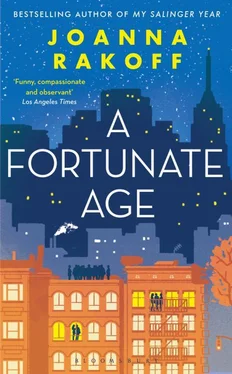“And you’re still in school?”
“Mmm-hmmm.” Across the room, Tuck’s friend Gary appeared to be shoving bananas down his pants. “The sad thing is, I’m one of those people who became an English major because I wanted to sit around and read novels. Whereas Tuck loves the hard stuff. He actually gets deconstruction and all that. It was all so easy for him.”
“Was he bored?” asked Tom Satville, his hand sliding lower, to her shoulder. She’d thought, somehow, that men didn’t hit on married women.
“Maybe,” said Lil.
“People like to be challenged,” he told her. “Especially intelligent people.”
“True.” This explanation pleased her, as it would allow her to give up her suspicion that Tuck was, simply, a failure, a person who lacked the drive and discipline to finish his degree, who had opted out at the first opportunity. Stop, stop , she told herself. Why would she be thinking this now on the night of his triumph? What was wrong with her? “I think also some people just can’t deal with the hypocrisies of academia. It’s like, they love books so much that dissecting them grows kind of tiresome . Like my friend Sadie.” She pointed across the room, where her friend, in a belted dress of dull gray silk, stood talking to Ed Slikowski, their dark heads bobbing toward each other. “Have you met her?”
He placed his glasses back on his face and peered toward the kitchen—not the direction she’d pointed—scrutinizing the throng of women attempting to uncork a bottle of champagne. “No, I don’t think so.”
“She’s Tuck’s editor,” said Lil. “Sadie Peregrine.”
“Oh, right! Yes. Sadie Peregrine. I’ve never met her, I don’t think—”
“She was the star of our department—”
“So you know her from—”
“Oberlin.” Lil tried to catch Sadie’s eye, but she was nodding enthusiastically at Ed Slikowski. “Everyone thought she would go to grad school. Her thesis won the big award. Her advisor wanted her to send it to The Atlantic .”
“What did she write on?” Lil hadn’t thought about this in ages. It was so embarrassing, how stupid she’d been, how unsophisticated. She had not been the star, but she could have been, she was sure of it, if she’d had parents like Sadie’s, if she’d gone to Dalton. Her own children—if and when she had them—would be raised in New York, without television; they would go to St. Ann’s, like Dave, where they could take yoga instead of gym.
“Dawn Powell. The Ohio novels.”
“Oh, brilliant ,” said Tom Satville, dipping his head in delight. He had, Lil thought, a faint British accent. “Most undergrads write on Plath or Dickens.”
“I know,” cried Lil, declining to mention that she’d written on Plath, though obscure Plath—the early landscape poems, really quite Audenesque, not “Daddy” and all that.
“Which one is Sadie, again?” the agent asked brightly. “I can’t believe we haven’t met. She’s Delores Rosenzweig’s assistant, right?”
“Sadie, come here,” Lil called loudly, by way of an answer. “We’re talking about you. Sadie.” With visible reluctance, Sadie pulled herself away from Ed Slikowksi, who held in his hands, Lil saw now, a bowl of the spiced nuts Sadie loved. “Sadie, this is Tom Satville. He works with Kapklein.”
“Oh, hello,” said Sadie, with a nod of her neat head. She knew Lil wanted her to say something brisk and professional, like, “Sadie Peregrine. I’m Tuck’s editor.” That was, of course, why Lil had called her over here, to instigate a frenzied professional discussion of the sort Lil disproportionately loved. Under normal circumstances, Sadie had no aversion to shop talk, but she was not in the mood for it tonight. This whole party—the huge deal Lil was making about Tuck’s contract, before he’d even signed the thing—made her nervous, for it only underscored the extent to which Tuck’s fate—and, by extension, Lil’s fate—lay in Sadie’s hands, a power she wasn’t quite sure she wanted, in part because, as of now, she didn’t have very much power, still being a serf in Delores Rosenzweig’s increasingly ineffectual fiefdom. An influential serf, sure, since Delores had largely checked out lately, to the extent that Sadie was essentially doing her job for her, but a serf nonetheless, with a whimsical and strange and anxious ruler, who often reneged on agreements and meted out unfair and illogical criticism or punishments.
There was promise of escape, though. The previous week, Sadie had been summoned for a talk with Val, her publisher, who had congratulated her on finding Tuck’s book—“Delores would have never even looked at that New Economy stuff”—and told her that as of July 1, she would be an associate editor (not assistant but associate , which meant a sort of double promotion) overseeing a new series of novels by writers under the age of thirty-five called “Fast-Forward Fiction,” a title clearly devised by a team of marketers who still listened to their Creedence Clearwater Revival or whatever on cassette tape. “If you can sit tight for a few more weeks, we’ll make it official,” said Val, with a tight smile. “It’s not official?” asked Sadie. Val shook her head. “It is. We just haven’t told Delores yet. So, please, not a word to anyone. We don’t want Delores to hear about it from anyone other than me.” “Of course,” Sadie told her, “I completely understand.” And she did—no one wanted to upset Delores—but she also didn’t . Why must they all be, perpetually, in Delores’s thrall? And, more important, if Delores put up a fight—as she might, for she’d certainly realized how dependent she was on Sadie—would they retract the promotion? This didn’t seem out of the question.
Sadie glanced at Lil, who looked anxious and weary, despite her constant proclamations of joy about Tuck’s book. The joy, Sadie thought, had been a bit too long coming, which was why Sadie had concocted her little plan. Though she’d failed to take into account the fact that she’d now have to work closely with Tuck, about whom she was still a bit too ambivalent. Sometimes she found him funny and charming, with a sly, satirical eye, and she wondered why she’d wasted so much energy disliking him. Just as often, though, she was disgusted by his overabundance of pride, which his dismissal from Boom Time had exacerbated rather than cured. Sadie didn’t doubt his affection for Lil, but she found something unnerving in his need to marry her immediately, and in the way, now, he made such a big show of her being his wife —his arm always draped heavily around her—never mind that he was eternally abandoning her, refusing to come with her on New Year’s Eve or, now, allowing her to be cornered by this smarmy guy, with his thin, reptilian lips and his ersatz British affectations (a tweed jacket in June ?), who was now blathering to Lil about the decline of the novel, but peering at Sadie expectantly, an ironic smile twitching at his jowls. He reminded Sadie of some sort of desert mole, with his dark, tiny eyes, blinking behind microscopic, rimless spectacles, his skin nearly the same colorless brown as his hair.
“So you worked with Kappy at Random House?” he asked, turning to her.
“I did,” she said, offering him, unthinkingly, a small grin. He was, she thought, the sort of fellow who would be easy to win over and hard to dismiss. Better to get away quick. Toward the back of the loft, she spotted Tal, leaning against the kitchen counter and glumly sipping a beer. He’d been acting strangely since Thursday, when his agent had given him the good news. In fact, he hadn’t wanted to come tonight. “You go by yourself,” he’d told her. “You haven’t seen any of them in ages.” It was true. She had been spending all her time with Tal. She hated to admit it—hated to think what it might signify about herself—but she couldn’t stand to be apart from him. At work, as she drafted letters and thumbed through manuscripts and checked on contracts and answered the phone, a low buzz, a sort of vibration, enveloped her body—she imagined it as a circle of wavy lines, the sort that connote electrocution in the old Warner Bros. cartoons—rising in volume and intensity as the day progressed, so that by six o’clock, her need to see him, to feel him and smell him, was as physical and unignorable as the need to breathe or sneeze. It wasn’t sex exactly. But she wasn’t sure what it was.
Читать дальше












